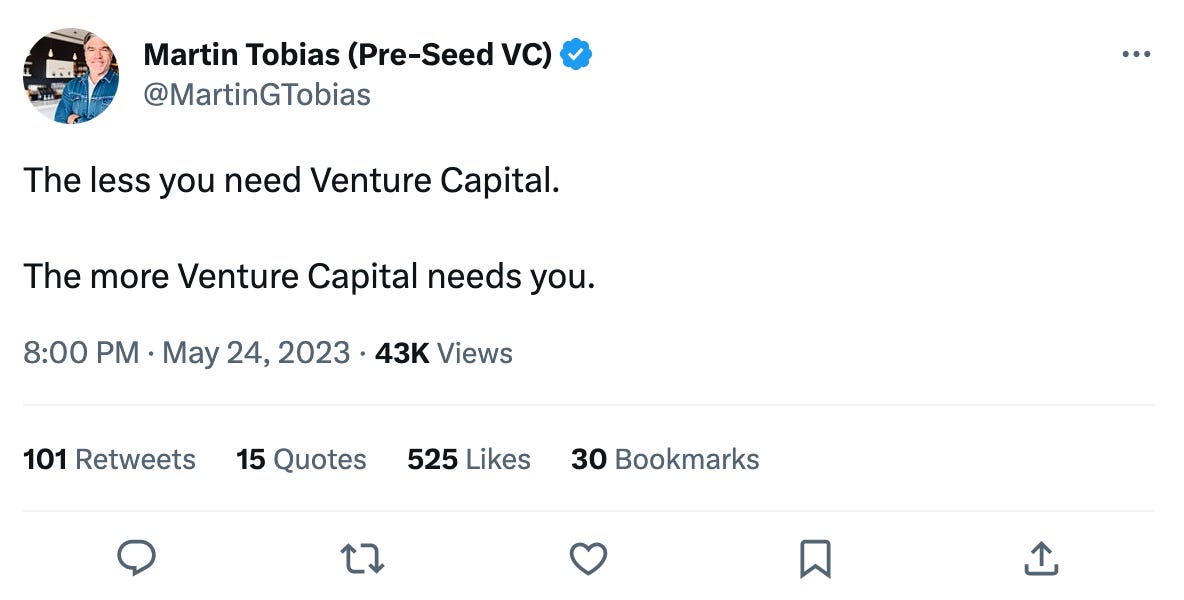Moneyball is a fortnightly newsletter from Koble exploring the limitations of human decision-making and their implications for startup investing.
We’ve spent two years developing our groundbreaking algorithms, which discover early-stage startups that outperform the market and predict their probability of success.
This week
🧠 Mental Model #16 – Thinking Big – Think (and build) big
📖 Investor reading – Investors turn to AI-guided dealmaking to gain edge over rivals – Filings reveal PE and VC returns amid escalating write-downs – Crypto VCs are facing a harsh reality as they navigate big bets on tokens
💬 Some tweets – Finally watched Ex Machina – The less you need VC the more VC needs you – No, venture is not killing itself
Think (and build) big
Thinking and building big is easier than thinking small. This might sound absurd, but it’s true.
Consider the inverse – thinking small is hard. For founders it means entering saturated markets with me-too products that fail to land with users; spending a fortune on paid distribution because nobody is telling their friends about the product; no’s from investors who need to envisage returning the fund with everything bet they make.
Thinking big changes everything. Rather than trying to wrestle a small chunk of an existing market from powerful incumbents, you’re inventing a new market that you can lead and monopolise.
That’s the curious thing about thinking big – it means starting small.
The biggest startups often begin with the smallest markets – markets so small, they may not even exist. They are always what sci-fi movie producers call “high concept” – they stand out in their ambition, imagination, even strangeness.
As Marc Winn has pointed out, thinking big also creates economies of scale – it takes no more physical labour to think big than to think small, but it creates the kind of operational leverage that drives exponential value creation.
Thinking big creates new technologies, product categories, business models, distribution channels. But most of all, it creates a big narrative that sucks people in – investors, talents, and users. Because big people want to work on big ideas.
The laws of physics dictate that in order for a planet to gravitationally attract our bodies it must be bigger than us. Similarly, a startup idea must be big enough to attract people – co-founders, investors, advisors, talent, customers. The founder’s task is to build a world with enough gravitational pull to attract and retain people – to stop them from floating away in search of something bigger.
Jim Collins has written extensively about the difference between companies that think and act big, and those that don’t. He believes that “good is the enemy of great”.
“Far better to dare mighty things, to win glorious triumphs, even though checkered by failure, than to take rank with those poor spirits who neither enjoy much nor suffer much, because they live in the gray twilight that knows not victory, nor defeat.”
And back in 2011 Google’s SVP of YouTube, Susan Wojcick, wrote a memo that emphasised the importance of “thinking big but starting small”. And in his essay “Frighteningly Ambitious Startup Ideas”, Paul Graham says that, “Empirically, the way to do really big things seems to be to start with deceptively small things.”
Implications for investors
The business of startups (building them, and investing in them) rewards those who think and build big. The alternative – thinking small – means ignoring the remorseless physics of startup investing.
“Big investors” only invest in big ideas, big markets, and big founders, understanding that every investment must have the potential to carry the losses of the fund.
But the healthy obsession with big can play out in counter-productive ways. Take for example, investors’ obsession with market sizing.
VCs are preoccupied with “big markets” due to power law dynamics. Massive TAM/SAM/SOMs (and pretty bubble charts) are non-negotiable. But this obsession can lead to investors passing on truly innovative businesses that create new categories and forge big markets. Who would have predicted the TAM for Generative AI five years ago?
Big things often arrive in small packages. Things that appear tiny can become unimaginably huge when you multiply them by time. As legendary ad men Al Ries and Jack Trout have pointed out:
“Real revolutions don't arrive at high noon with marching bands and coverage on the 6PM news. Real revolutions arrive unannounced in the middle of the night and kind of sneak up on you.”
The strange interplay of big and small is difficult for investors and founders to model, which is why most fail. The answer lies in imagination. H.G. Wells over The Lean Startup; obsession over work-life balance; passion bordering on madness over conventional wisdom.
This is the Koble way.
We’ve chosen to do things differently with our technology, eschewing the relative safety of a traditional and oh-so-obvious SaaS business model in favour of risk and skin in the game. Thinking and building big is what we do.
Because in the high-stakes startup game, playing it safe is sometimes the most dangerous thing you can do.
Work with Koble
At Koble, we’ve spent two years developing our groundbreaking algorithms, which discover early-stage startups that outperform the market and predict their probability of success.
We’re working with forward-thinking angels, VCs, family offices, and hedge funds to re-engineer startup investing with AI. If that resonates, get in touch.
Investor reading
🤖 Investors turn to AI-guided dealmaking to gain edge over rivals – The pace of AI development has spurred investors to use the tools to identify fast-growing companies and acquisition targets.
📉 Filings reveal PE and VC returns amid escalating write-downs – Some high-profile VC and PE firms are slashing the valuation of their holdings, causing billions in apparent profits to evaporate.
😰 Crypto VCs are facing a harsh reality as they navigate big bets on tokens during the downturn – Times are hard for VCs right now, but for those who’ve raised billions to invest in the crypto space, things are looking even tougher.
Some tweets
Parting shot
“Whatever you can do or dream you can, begin it; boldness has genius, power, and magic in it.”
― Johann Wolfgang von Goethe
Regards from your [big] startup investing AI,
About Koble
Koble is re-engineering startup investing with AI, applying quantitative strategies that have disrupted public markets to early-stage startup investing.







